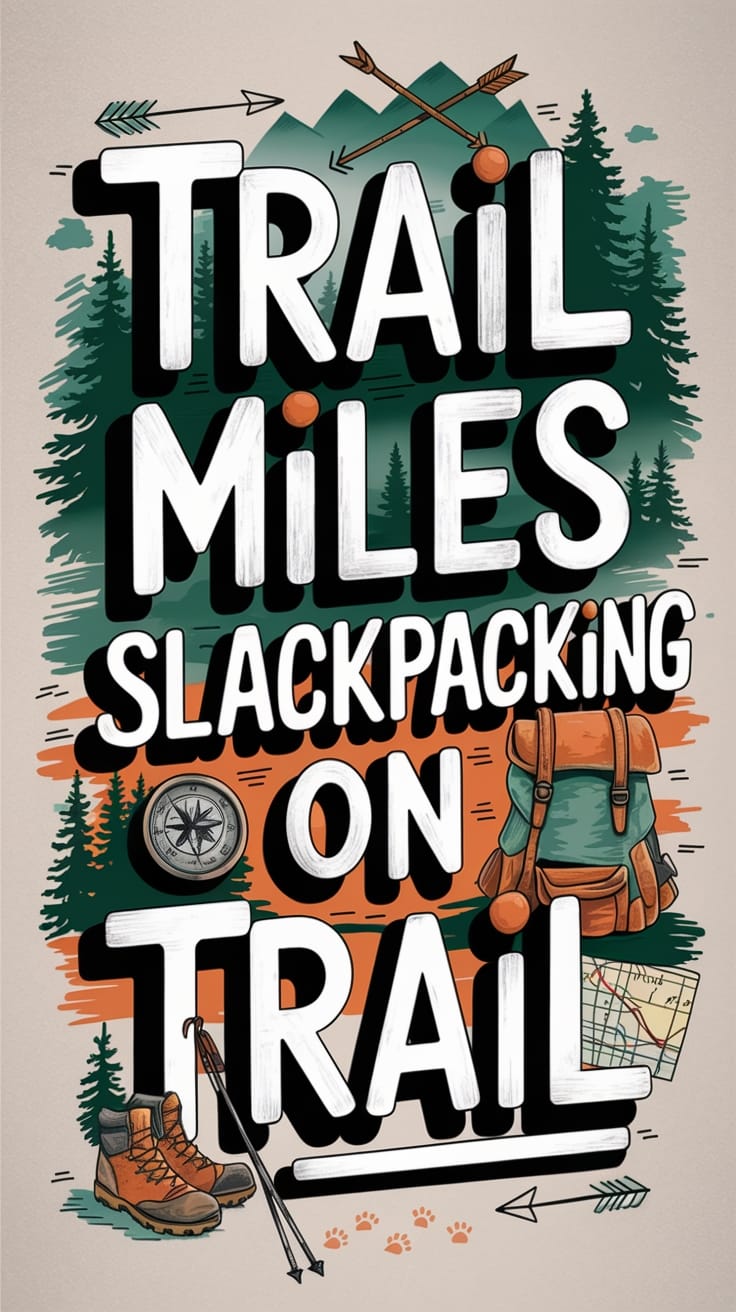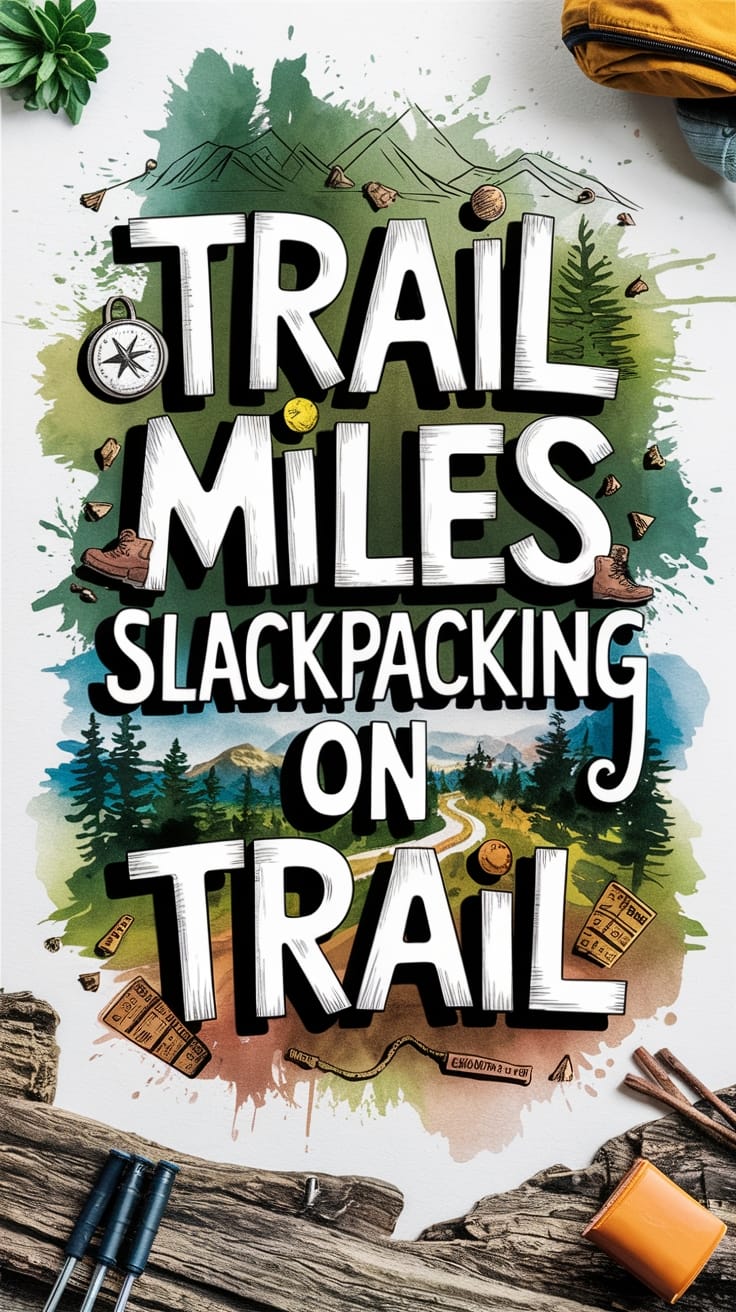When you begin learning about thru-hiking and especially when you watch some of the YouTubers who daily VLOGed their trips you will hear the term "slack packing" tossed around, so what does slackpack mean for hikers on the trail?
My hope is that by the end of this, you will understand the reasons why someone would choose to slackpack and why it can make a long-distance trail pursuit more fun, less stressful, and faster.
Who Chooses to Slackpack and Why?

Choosing to slackpack allows for an overworked body to get a break from carrying a heavy load while granting gazelle-like speeds and to put serious miles in. In addition, growing injuries give you a chance to continue moving with some ailments instead of just sitting idle.
On a long-distance hike, slackpacking can be done for many reasons:
- To avoid excess wear and tear on your body too early in your hike
- To cover more miles each day and finish sooner
- Simply because you don't want to carry all of your gear
Many thru-hikers choose this method to help reduce stress on their bodies and enjoy their surroundings more. It also allows for a unique approach to traveling on the trail that being saddled with a backpack won't which is at speed and light-footed.
Key Logistics to Iron Out Before Slackpacking

Know Your Host - Person Taking Your Gear
Nothing would be worse than to accept a slackpack from someone only to have them drive off never to be seen with your gear! If this happened it would leave you out on the trail stranded without anything left to help finish the trail without a great expense!
You would also want to understand how they plan to identify your gear to get it back to you. You don't want them to give your pack or items to someone else before you reached them down the trail.
It's vital to understand their organizational skills and if they won't talk these through with you then I would consider that a serious red flag.
Communication With Your Host
You need to be on the same page as them for the trek to be beneficial to both of you, so the first thing should be to build a plan with them with the starting point and more fleshing out of the trip.
You want to cover details like how to tell them you have reached the end of the trek:
- Are you going to be contacting them?
- Is it a scheduled pick-up time?
- Is it a scheduled pick-up location?
- Is it some other agreed-upon meet-up or is your main gear to be dropped someplace like a hostel along the way?
Planning and having rock-solid communications with your slackpacking host ensures you a hitch-free fun experience.
Make Sure to Thank Them
Most thru-hikers will be gracious by nature but make sure to thank anyone who helps out, answer their questions if they have them, and just be open to your experience and how you can influence their impression of thru-hikers.
Be Prepared - Gear and Trail Meet Up(s)
This is a close follow-up on the above communication point as you need to make sure you have all these little details ironed out when you slackpack.
This includes what you will need for the day on the trail and if you are slackpacking for multiple days to make sure you have all the meetup points to be picked up or swap out gears.
In addition, if you are meeting your slackpacking host at a certain point on the trail make sure to know where that is and have it written out as well as what time you should arrive so there are no surprises for either party.
Are They Providing a Day Pack
Some trail angels or others who provide slackpacking on the trail will even provide a full setup for day hiking with a day pack.
Others may not so make sure you understand what they can and can't provide you is vital to your enjoyment and comfort.
What Gear You'll Need on a Slackpacking Day
What will be needed for where you will be traveling to? This question is vital to understand what you should bring along for the slackpacking trip.
In general, things like a first-aid kit, enough water and food, proper layers for the weather, a map, and compass, and a headlamp are always essential.
Work out Bail Out Plan
What happens when everything is going wrong, a storm coming in for example, what is the plan for basic trail safety and getting off the trail?
You need to understand this with your slack packing host as you don't want to be caught in a bind if things go wrong, have an exit strategy so you can both know what needs to happen should something unforeseen occur always practice basic trail safety.
Benefits of Slackpacking on a Thru-Hike

There are many benefits or reasons why slackpacking can make a thru-hike more enjoyable on plenty of trails.
Some of the big hiking day benefits are:
You'll cover more miles each day and finish sooner
By not carrying a heavy load on your back, you'll be able to hike more miles each day. This is especially beneficial if you're trying to finish your thru-hike in a shorter amount of time.
You'll avoid wearing out your body too early
Carrying all of your gear can take its toll on your body, especially if you're not used to it. Hiking without a backpack will give your body a break and help you avoid injuries.
You'll be able to enjoy your surroundings more
Imagine taking in those beautiful views without having to worry about your heavy backpack getting in the way or forgetting gear items. When you slackpack, you'll be able to enjoy your surroundings more and take in all that nature has to offer.
It's a great way to take a break from carrying a heavy load
Sometimes the shoulders and hips just get exhausted and a break is much needed. Carrying a slackpack for a day or two can give your body the time it needs to rejuvenate and continue on with your thru-hike.
Injuries will have less of an impact on your hike
Slackpacking lightens the weight and short of having bad foot, leg, or knee injuries, thru-hikers with injuries slackpack to be able to move without being stuck and waiting days to weeks to recuperate.
When to Incorporate Slackpacking on Your Thru-Hike
Most will choose based on the terrain on the trail as slackpacking can be done almost anywhere as long as you can find someone to care for your gear during the section.
A lot of thru-hikers will begin to look into it towards the middle to end of their thru-hike as they start to feel the aches and pains more as their bodies have taken more and more of a beating.
To a long distance hiker the opportunity to be unencumbered and slam miles has a greater and greater allure the longer you hike.
It is also a great way to take a break from carrying the big pack and rest up when you know big and hard miles are upcoming while still making distance on the trail itself.
Why Thru-Hikers Love to Slackpack
When you start a thru-hike, especially a longer one like the Appalachian Trail, you feel your best with your body as you have optimal nutrition and many fewer hours on your legs and feet.
Over time, finding ways to drop some of this weight can be hard for a hiker to not take advantage of. For some, the allure of slackpacking can be too much to resist, and they will start looking for someone who can help them along the way.
I know many don't seem to think this is very purist, maybe it isn't, but each person is hiking for their reason, or HYOH (hike your own hike) as they say.
Essential Strategies for Safe and Efficient Slackpacking
Slackpacking can be a great way to reduce the weight on your body while still being able to make progress on your long-distance trail.
It can also be a way to take a break from carrying a heavy pack and rest up before continuing on with your thru-hike. There are many benefits of slackpacking, which is why so many hikers choose or find ways to try them when they're on their thru-hike.
If you're thinking about slackpacking on your thru-hike, make sure you understand the risks and plan out what would happen if things go wrong. Remember the time in the woods is very beneficial for your overall health and wellbeing regardless of how you approach it.








